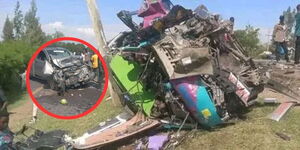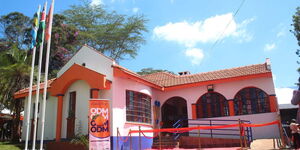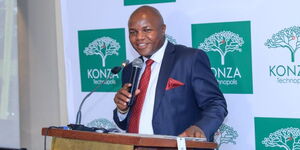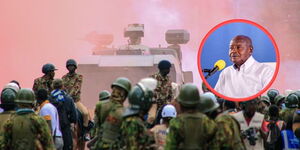"Appear at the height of your power."
This concept from the 48 Laws of Power, captures the narrative of former Harambee Stars player Daniel Nicodemus' mastery of self-presentation.
Nicodemus masterfully tailored his public character to mirror the strength and promise that Kenya's newly independent government intended to present, making him a powerful symbol of the country's ambitions.
Nicodemus, according to Haq Malik, Kenya's national football team manager at the time of independence, embodied the fledgling nation's energetic and resolute attitude. Nicodemus' skill and talent focus helped Kenya beat Scotland at the Independence tournament by 1 goal despite conceding two.
However, Nicodemus' actual character remained hidden behind this powerful façade. While coaches were convinced of Nicodemus' critical role on the team, the layers of Nicodemus' intentional deceit were not immediately obvious, proof that looks are deceiving.
Playing for Luo Union FC and the national team did not pay well or contribute to a player's development. Nicodemus felt he needed more money to sustain himself. This is a problem that Kenyan sports personalities are all too familiar with.
Nicodemus played for Luo Union FC and Harambee Stars. However at night, he would engage in criminal activities. Nobody knew about this until his criminal activities eventually caught up with him, landing him significant time in cells and in jail.
As a player Daniel Nicodemus often disappeared, going missing for extended periods just to emerge unexpectedly owing to demands issued by fans.
The national team coaches—Elijah Lidonde, Peter Oronge, Eckhardt Krautzun, and Jonathan Niva—experienced firsthand difficulty of operating without Nicodemus. Fans shouted their displeasure every time he was absent, placing the coaches in a state of constant anxiety.
He hardly revealed his thoughts to anyone who struck up a discussion with him. This became increasingly obvious over time, as concerns about what else he did in life except football grew louder.
Everything came to light one day. After nearly a day of searching, relatives and friends found his bullet-riddled frozen corpse on the harsh cement slabs of the Nairobi City Mortuary. Daniel Nicodemus was dead.
There was almost instant outrage in Parliament. James Orengo, MP for Ugenya, stood to ask a question on the floor of Parliament:
“I beg to ask the Minister of State, Office of the President, the following question by Private Notice: Is the Minister aware that on the 20th June, 1981, police searched the house of a Mr. Nicodemus Odhiambo (Arudhi) in Nairobi in his absence? Is he further aware that Mr. Odhiambo later reported to Shauri Moyo Police Station and the Criminal Investigation Headquarters as asked to do so by the police and that, thereafter, he was not seen again and his body was later found in the City Mortuary? Could he explain the circumstances that led to the death of Mr. Odhiambo?”
Accounts explain his death in the following ways: Patrick Shaw, the towering crime-fighter of the 1970s who had two official positions - Assistant Director of Administration at Starehe Boys' Centre and School and Kenya Police Reservist - gunned him down.
Shaw was on his way to the Starehe Boys’ Centre. He came to a halt before the entrance of one of the restaurants at Kariokor Market in his white Volvo 244 GL Saloon with its distinctive blue strobe light. He strolled in, remained for a bit, then departed.
The team then learned that Shaw had instructed Daniel's mother, Salome, to "tell your boy to stop what he is doing or else I will stop him."
He was famous for issuing similar warnings to the many offenders whom he ultimately eliminated in cold blood after which he would go to their funerals.
Nicodemus' fate had been determined, and it was only a matter of time until he met his demise. On the night of June 22, 1981, Daniel's bullet-riddled body was deposited on a slab at the City Mortuary.
Orengo, then in his second year as a Member of Parliament, took up his case again in Parliament.
The following is a transcript of the Hansard recording of the Nicodemus discussion in Parliament, during which Orengo refused to accept a mediocre answer from the State.
Orengo: Mr. Deputy Speaker, Sir, since I have not been given a satisfactory answer, I beg to give notice that I want to move a Motion of Adjournment on the rise of the House at 6.30 pm. (Applause)
Deputy Speaker: Order! Hon Orengo, there was no need for you to say that. All you need to do is come to my office and we will speak about this. Let us continue now. " And that was the last of that topic in the house.
Nicodemus had appeared in Nairobi court in January 1973, accused of stealing Kshs10 from the Bird Cage Club on Government Road (now Moi Avenue). He was released on bond.
The hearing began in May of the same year. But before the hearings could begin, his lawyer, D.N. Kibuchi, informed the court, "My client no longer wants me to defend him. As a result, I have applied to withdraw from the lawsuit." He was in and out of remand detention so frequently that many people lost track of whether he was free, in custody, or even outside the country.
The Magistrate allowed Kibuchi's application and then ordered Nicodemus to find another lawyer by noon the same day. Nicodemus was unable to find one and was obliged to mount his own defense. He was convicted of using a chisel to rob a bar manager of ksh10. He sentenced him to three years in jail.












